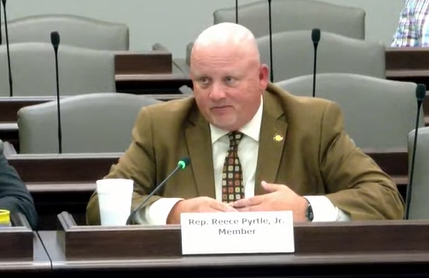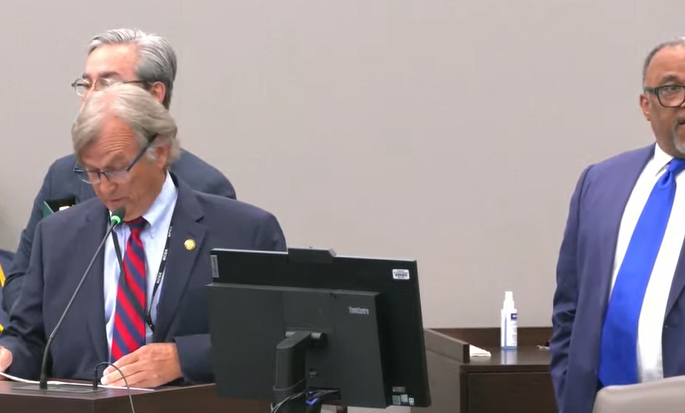
RALEIGH, N.C. (WGHP) – Members of the North Carolina House Health Committee, who may or may not support legalizing medical marijuana, now have a very clear understanding about why the idea keeps emerging for their consideration.
As Rep. Larry Potts (R-Davidson) had promised, Senate Bill 3 did not get a vote in his committee on Tuesday, but there were numerous questions designed to bring clarity about why this bill is so sensitive for members. Nearly a year ago the Senate passed SB 711, 35-10, but the House didn’t take it up before adjournment about three weeks later. This discussion at least advances the issue.
No one is more sensitive about all of this than the bill’s primary sponsor, Sen. Bill Rabon (R-Brunswick), who dropped by the House with his cosponsors, Michael Lee (R-New Hanover) and Paul Lowe (D-Forsyth), to pitch a bill he has backed for several years. In so doing, he shared the personal journey that pushed him to embrace an idea that had been foreign to him – consumption of marijuana.

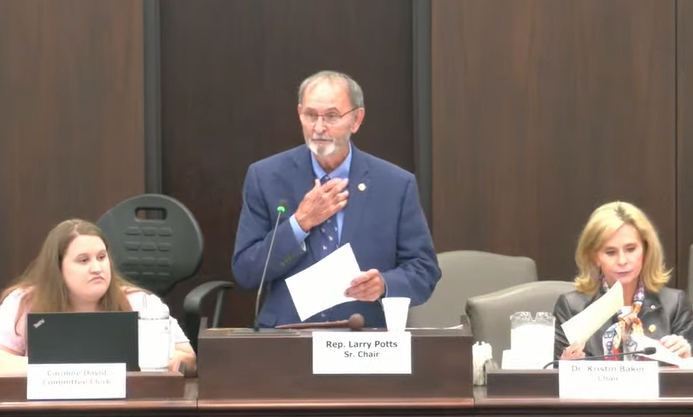
SB 3, the “North Carolina Compassionate Care Act,” which was passed by the Senate on March 1 with bipartisan support, is designed to allow physicians to prescribe cannabis products – including marijuana to smoke – for patients suffering from among 15 specific conditions listed in the bill. Critics – and two members of the public who spoke against the bill – are concerned that this would lead to the legalization of recreational marijuana – which is legal in 22 states – and that the medical effects of the usage are anecdotal and not based on science.
Anecdotal evidence is what Rabon provided, at the encouragement of Rep. Allen Chesser (R-Nash), a veteran, and it illuminated why supporters of this issue cut across both parties, ages and races and have a passion for its potential impact on the public.
One man’s story
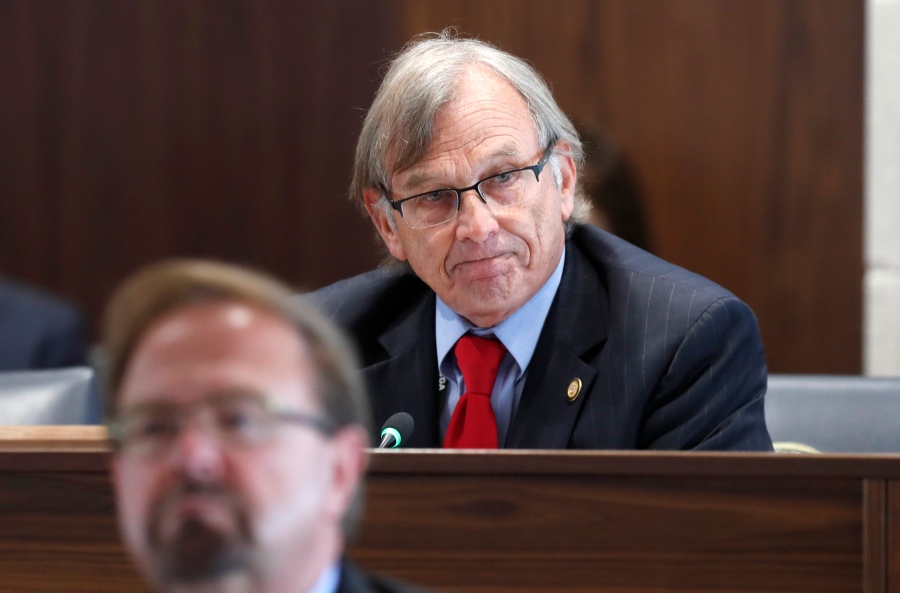
Rabon, who will turn 72 in July, said he was diagnosed at age 48 with stage 3 colon cancer. He said the first words out of his doctor’s mouth were his name, “and then he patted me on my knee and said, ‘It’s OK to die.’”
Rabon wasn’t interested in a diagnosis that suggested he had 18 months to live. “I started treatment – I can taste the chemo as I stand here and talk – and after three months, I told my doctor that I don’t feel a bit different. … You have 12 months to cure me or kill me.
“He said, ‘I’m going to make you real sick. I don’t know if you can take it, but I’m going to try.’ He said, ‘You need to get some good marijuana. … The pills I prescribe aren’t going to work.’”
Rabon said he told his doctor that he didn’t use drugs and that he only bought and sold controlled substances as part of his work as a licensed veterinarian. He said the doctor asked Rabon if he had a way to get marijuana.
“I told him I own a fleet of fishing boats,” Rabon said. “My problem is keeping drugs off those boats.”
So Rabon said he talked to his chief of police and his sheriff and told them what he was going to do.
“I never bought the first drug,” he said. “Marijuana appeared in my mailbox on an as-needed basis.
“I would go to work every morning at 7 o’clock. I had a La-Z-Boy in my office. I’d sit there until someone would come in and say, ‘Dr. Rabon, you have a patient.’ I never missed a single day’s work. … I knew if I did, I’d die.
“Around 1:45 and 2:10 every day, I’d get so nauseated that I couldn’t take it anymore. I would go outside, put my hands on my building and heave until I got the strength to drive home.
“I’d go home and light up a joint, whatever you call it – I never smoked – and I’d take three puffs, and my symptoms would go away, just like that.
“I did that until I completed my chemo. … There is no science behind it, but I know, I know there are tens of thousands of people who could benefit like I did.”
Numerous questions
When he first pitched this version of the bill in the Senate, back on Feb.16, Rabon said he had spent three years on this issue and that “hopefully this will be the last year.” Lee said he felt like the bill “has gone through 200 committee hearings” over the past few years.
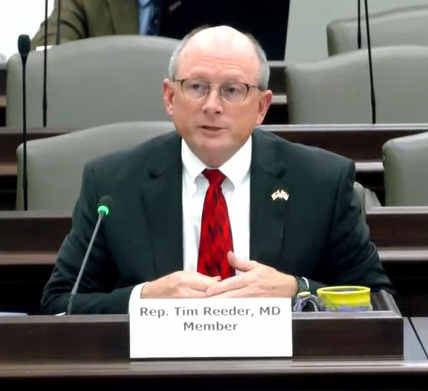
Most of the questions and comments from committee members on Tuesday – tightly controlled Pitts’ 2-minute limit and ban on follow-ups – dealt mostly with details in the bill about how prescriptions would be allocated, how the 15 specific conditions listed in the bill were derived and the licensing and production requirements for manufacturers.
Rep. Tim Reeder (R-Pitt), a medical doctor, was asking if HIV/AIDS could be removed from the list of 15 maladies to be treated. That would require an amendment, and the meeting did not consider amendments.
Rabon and Lee – with occasional help from staff members – answered all of them, reiterating that this was “tightly regulated use of medical cannabis only for those with debilitating conditions – certified by their doctor. … Recreational sale of marijuana remains illegal,” Rabon said.
A new perspective
Rep. Donny Lambeth (R-Forsyth) is a retired hospital administrator and also the author of the Medicaid expansion that was signed into law earlier this year, and he admitted he had “been on the fence” about this bill.
“We obviously have been lobbied by lots of texts and emails,” he said. “Many are concerned that this is a step leading to recreational marijuana. … I saw a lot of people … that celebrated being cured from cancer … lots of difficult diseases … those patients reached out and asked about the vote.
“Those who have gone through very difficult illness and disease – as you have, Sen. Rabon – said this is a way to administer the pain. They said to me – and these are ministers and community leaders – please help us. They believe this [medical cannabis] can help.”
Lambeth said he went on a fact-finding visit to Mississippi – where medical marijuana is legal – with about 15 people to see how medical cannabis was handled there.
They “set this up in a very controlled environment, a very large warehouse, with lots of greenhouses. There was strong regulation, strong security. … It made an impression on me.
“I was still on the fence. My biggest concern is that this is a step toward recreational marijuana. … But I see how this was regulated and controlled, and I had a different perspective. … It helped me understand what you are talking about. … Regulators make sure that even dust on the floor has to be accounted for.
“I applaud you for trying to help people in pain. … People want our help. … I appreciate you at least bringing this to us.”
Public comments
David Evans, who represents North Carolinians Against Legalizing Marijuana, said that when it came to whether the bill would lead to legalizing recreational cannabis, “every bill sponsor said the same thing. In every situation, they are 100% wrong.”
He noted that the oversight commissions would be appointed by Gov. Roy Cooper, whom he said supports legalizing recreational marijuana. Cooper supports decriminalizing simple possession.
Evans said he had cancer three times and smoked marijuana in college.
“I’m sure it made them feel better,” he said. But he said this should be decided based not on anecdote but on science. “Exercise some humility. … You are not the FDA. All conditions have very limited evidence.”
Elizabeth Page of Wake County suffers from multiple sclerosis and said the National Multiple Sclerosis Society supports medical cannabis but not recreational marijuana.
Corinne Gasper told the story of her daughter, whom she said was killed in a wreck when the driver was high on marijuana and had a prescription for medical use.
Pitts gave Rabon the last word, which he used to clarify the suggestion that every state that had entertained medical marijuana had gone on to legalize recreational use.
“That’s not correct,” he said. “Hawaii … has defeated a move to legalize … Mississippi, Utah, and Florida have medical marijuana and have not legalized recreational marijuana.”
What’s in the bill
- SB 3 lists 15 specific conditions that can receive cannabis treatment, including cancer, epilepsy, HIV/AIDS, ALS, sickle-cell, Parkinson’s syndrome, multiple sclerosis and post-traumatic stress disorder – or PTSD – which veterans groups back.
- There are a commission and advisory board that will be served by 4-year appointments and overseen by the NC Department of Health and Human Services to regulate this implementation.
- 10 licensed dealers based in North Carolina (at least two years) who each can operate up to eight outlets from seed to sale. They can have out-of-state partners. Those numbers might need to be addressed to reach saturation across all 100 counties.
- There is a $50,000 initial licensing fee and then a $10,000 a year recurring fee for each facility.
- The criminal law does not change, but law enforcement will have data on all those who are licensed, who prescribe and who have been approved for prescriptions.
- Prescribing physicians must go through 10 hours of training to be certified and then complete 3 hours of continuing training each year.
- Cannabis can be consumed through smoking, vaping or edible products.
- Implementation would be in 2024.
- The state is projected to realize about $44.4 million in new revenue by 2027-28. Retail sales are expected to reach about $504.3 million by 2028-29, based on a rate of $287 per ounce, to serve a projected 214,000
Suggest a Correction


